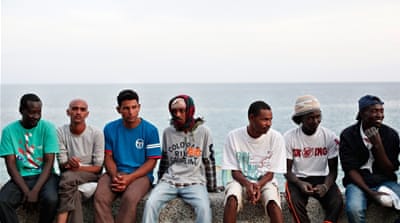Europe’s soft dictatorship
Hungary’s increasingly extreme reaction to the EU migrant crisis is stoking fears of an emerging dictatorship.
![Migrants lying under a bridge on a bank of the river Sava in Belgrade, as they rest on their way to the Hungarian-Serbian border [AFP]](/wp-content/uploads/2015/06/3cb6280e60434d3799205c4a8489c283_18.jpeg?resize=770%2C513&quality=80)
In mid-June, about a hundred migrants – mostly from war-torn Sudan, Somalia, and Eritrea – attempted to cross Italy’s border into France, but were denied entry. The incident provoked Italian Prime Minister Matteo Renzi to not only claim that the EU’s response to the arrival of tens of thousands of migrants on Italy’s shores had “not been good enough”, but to also warn the EU that Italy would deploy an anti-immigration plan that would “hurt Europe“.
“If Europe wants to be Europe,” said Renzi, “it has to take on this problem as a single bloc. This is Plan A. If Europe chooses solidarity, good. If it doesn’t, we have Plan B ready. But it would first and foremost hurt Europe”.
Keep reading
list of 4 itemsWhat happens when activists are branded ‘terrorists’ in the Philippines?
Are settler politics running unchecked in Israel?
Post-1948 order ‘at risk of decimation’ amid war in Gaza, Ukraine: Amnesty
Now, Hungary is deploying Plan B.
 |
| A repainted anti-immigration billboard [Getty] |
Only a few days after Renzi’s harsh critique of the EU’s immigration policy, Hungary announced plans to build a four-metre-high wall along its 175km border with Serbia to stop the flow of undocumented migrants.
Equating immigrants with terrorists
At the same time, as part of the government’s national consultation on immigration and terrorism, eight million questionnaires were sent to citizens, asking, “Would you support the government placing illegal immigrants in internment camps?” and “Do you agree that mistaken immigration policies contribute to the spread of terrorism?”
In other words, Viktor Orban’s government is openly equating immigrants with terrorists and even recommending that they be sent to work camps.
Additionally, in May, the Hungarian government distributed a series of posters suggesting that immigrants were unwelcome in the country; posters with slogans such as “If you come to Hungary, you must respect our laws!” and “If you come to Hungary, you must not take work away from Hungarians!”
In office for two years, in 2012 Orban declared the potential need for a new political system in Europe.
“Let us hope that God will help us,” he said, “and we will not have to invent a new type of political system instead of a democracy that would need to be introduced for the sake of economic survival”.
In a speech in July 2014, Orban finally announced the death of liberal democracy and the arrival of a new form of state called the “workfare state“, which would abandon liberal methods.
Successful dictatorships?
|
|
And then, in one of his speeches in May, Orban went a step further, claiming explicitly that “dictatorial countries are more successful than democratic ones“.
And what has the EU’s reaction been to Hungary overtly sliding into dictatorship?
When Hungary announced that it would build its anti-immigrant wall to separate it from Serbia, the EU’s commissioner on immigration said, “We have only recently taken down walls in Europe; we should not be putting them up.”
But this is far from the truth. What Europe is undertaking at the moment is something we might call the “outsourcing” of new walls. Just take the anti-immigration walls between Morocco and Spain, which were constructed by Spain on the North African coast to deter potential migrants from crossing into Europe. So, instead of building walls in Europe, we build them in countries where the migrants come from. Instead of solving the problem, we are “outsourcing” the problem.
And it was again Renzi who detected where the real problem came from in the first place. He openly said that the international community, after toppling Libyan leader Muammar Gaddafi in 2011, bore responsibility for the chaos in Libya that forced hundreds of thousands of migrants to cross by boat to southern Italy. Over the last year alone, more than 170,000 migrants reached Italy from Libya, and so far this year’s total is about 57,000.
Libya, among other countries, makes it clear that it is not only the EU’s failed immigration policy that is causing this humanitarian catastrophe; it was the EU’s war policy that created the conditions for such unprecedented immigration waves in the first place.
 |
| Hungarian Prime Minister Viktor Orban [Getty] |
Hungarian dictatorship
And the real reaction to this humanitarian catastrophe was best embodied at the recent EU summit in Riga, Latvia, where the Head of the European Commission Jean-Claude Juncker jokingly greeted Orban with a “Hello, dictator,” and slapped him on the cheek.
Although it is clear that Hungary is openly moving towards a dictatorship, the EU’s political leaders refer to the prospect as a joke. The real threat to the EU is not Italy’s or Hungary’s Plan B.
The real threat is the cynical attitude represented by Juncker and his fellow commissioners, who are not only provoking military wars from Libya to Syria and economic wars from Spain to Greece, but are now “outsourcing” the very problems they created.
Hungary’s inclination towards dictatorship has only been encouraged and made worse by the EU’s own dictatorship. After all, the only thing worse than dictatorship is a soft dictatorship.
Srecko Horvat is a philosopher from Croatia. His latest books include “After the End of History. From the Arab Spring to the Occupy Movement” and “What Does Europe Want?”, co-authored with Slavoj Zizek.
The views expressed in this article are the author’s own and do not necessarily reflect Al Jazeera’s editorial policy.
